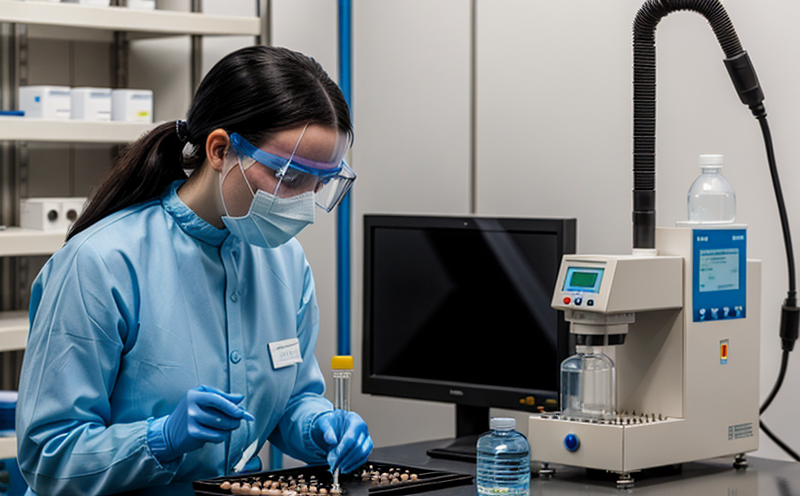Pyrolysis GC MS Degradation Product Testing
The Pyrolysis-Gas Chromatography Mass Spectrometry (Py-GC/MS) Degradation Product Testing service is an advanced analytical technique used to identify and quantify degradation products in pharmaceutical compounds. This method involves subjecting a sample to controlled heating, or pyrolysis, under inert conditions followed by gas chromatographic separation of the generated volatile compounds, which are then analyzed using mass spectrometry.
This powerful combination allows for the detailed examination of complex mixtures and provides qualitative and quantitative information about the components present in the original substance after degradation. The technique is particularly useful for studying stability issues and potential impurities that may arise during manufacturing processes or storage conditions.
The process begins with precise sample preparation, ensuring that only relevant compounds are subjected to pyrolysis. Once prepared, the sample undergoes thermal decomposition at temperatures ranging from 500°C to 1200°C depending on the molecular structure of the compound being analyzed. This step liberates smaller molecules from larger parent structures, including degradation products.
The resulting gases are then directed through a gas chromatograph where they are separated based on their volatility and polarity. After separation, these components enter the mass spectrometer for final identification via fragmentation patterns characteristic to each compound. By comparing detected fragments against databases or reference standards, highly accurate identifications can be made even when dealing with unknown compounds.
One key advantage of Py-GC/MS is its ability to detect trace amounts of degradation products that might otherwise go unnoticed using other analytical methods. Additionally, it offers excellent resolution for complex mixtures without requiring extensive sample preparation compared to alternative techniques like HPLC-UV or NMR spectroscopy.
This service plays a critical role in ensuring drug quality by identifying any unintended changes within active pharmaceutical ingredients (APIs), excipients, or final formulations throughout their lifecycle. Regulatory bodies such as the FDA and EMA require thorough stability studies during development phases to demonstrate that new drugs remain stable under specified conditions over time.
For instance, during clinical trials or post-marketing surveillance, understanding how APIs behave under various stress conditions helps inform formulation decisions aimed at maintaining efficacy while minimizing risks associated with impurities. Moreover, manufacturers can use this information to optimize processes reducing unwanted byproducts and improving overall product quality.
The application of Py-GC/MS in pharmaceutical testing extends beyond just degradation studies; it also supports research into drug metabolism and pharmacokinetics by analyzing metabolites formed during biological processes within the body.
By providing detailed insights into chemical transformations, this service contributes significantly to both regulatory compliance and innovative drug development efforts. It ensures that only safe and effective medications reach market shelves while fostering continuous improvement in manufacturing practices.
Industry Applications
- Pharmaceutical Manufacturing: Monitoring API stability during production processes.
- Drug Development: Identifying potential degradation pathways early in R&D stages.
- Regulatory Compliance: Meeting FDA, EMA, and other global regulatory requirements for drug approvals.
- Quality Control: Ensuring consistent product quality across batches and lots.
- New Drug Applications (NDAs): Supporting data submission for new formulations or extended indications.
- Post-Marketing Surveillance: Detecting unexpected changes in marketed products over time.
- Formulation Optimization: Identifying optimal processing parameters to minimize degradation.
- Metabolite Profiling: Studying how APIs behave within biological systems and their metabolism.
Why Choose This Test
The Py-GC/MS Degradation Product Testing service offers several benefits over traditional analytical methods when it comes to assessing drug stability. First, its unique capability of detecting trace levels of degradation products makes it indispensable for ensuring high-quality APIs meet strict purity standards demanded by regulators worldwide.
Secondly, the ability to analyze complex mixtures without extensive sample preparation sets this service apart from other technologies like HPLC-UV or NMR spectroscopy. This feature reduces labor-intensive steps involved in preparing samples, thereby saving time and resources crucial for timely submissions during regulatory reviews.
Thirdly, Py-GC/MS provides not only qualitative but also quantitative data about the degradation products present in a sample. Quantitative results are essential for determining acceptable limits for impurities according to international standards such as USP , ICH Q7A guidelines, and EMA Q1B recommendations.
Moreover, this service supports cutting-edge research into drug metabolism by characterizing metabolites formed during biotransformation processes. Such knowledge is vital for understanding how drugs interact with human physiology, guiding future therapeutic developments aimed at enhancing patient outcomes.
A fourth benefit lies in its role as a compliance tool used to meet stringent quality assurance protocols required by major pharmaceutical companies and regulatory authorities alike. By providing comprehensive data on drug stability under various conditions, this service helps ensure that manufacturers adhere strictly to Good Manufacturing Practices (GMP).
Lastly, Py-GC/MS supports continuous improvement initiatives within organizations by offering valuable feedback on current manufacturing processes. This information can be used to identify areas needing optimization or modification to enhance overall productivity and efficiency.
International Acceptance and Recognition
The Pyrolysis-GC/MS Degradation Product Testing method enjoys widespread acceptance across numerous international standards bodies due to its robustness, reliability, and accuracy. Notably, it is recognized by major regulatory agencies including the US Food and Drug Administration (FDA), European Medicines Agency (EMA), World Health Organization (WHO), and International Conference on Harmonization (ICH).
For instance, according to ICH Q7A guidelines, Py-GC/MS serves as a suitable analytical tool for demonstrating drug stability during development phases. Similarly, USP specifies that this technique can be employed for determining impurity levels in APIs intended for human use.
The EMA Q1B recommendation further emphasizes the importance of using Py-GC/MS to identify and quantify degradation products within pharmaceutical compounds. These standards underscore the significance of this service in ensuring drug quality, safety, and efficacy throughout their lifecycle.
In addition to regulatory compliance, Py-GC/MS enjoys favor among leading pharmaceutical companies worldwide for its role in supporting advanced research projects aimed at developing novel treatments. Its ability to provide detailed insights into chemical transformations within complex mixtures makes it an invaluable resource for both academic institutions and industry leaders alike.





